牛津版七年级英语上重点难点讲解
七年级英语上册(沪教牛津版2024)-【新教材解读】义务教育教材内容解读课件

目录
第一部分 《英语新教材(2024沪教牛津版)》目录结构比对 第二部分 《英语新教材(2024沪教牛津版)》各章节具体变化 第三部分 《英语新教材(2024沪教牛津版)》各章节教学安排 第四部分 《英语新教材(2024沪沪教牛津版)》变化要点解读
新旧教材体例结构对比
旧教材单元
旧教材 1.导读页:无
新教材单元
新教材
1.导读页:提出关键问题 单元学习目标 思考本单元要学习的问题
Unit 5 Visiting the Moon
2.Reading: A trip to space Listening: The Space Hotel Grammar: The simple future tense Speaking: A trip to the Space Museum
新教材单元
新教材
1.导读页:提出关键问题 单元学习目标 思考本单元要学习的问题
2.Reading:New school, new friends
Listening: A survey about friendship
Unit 1 Friendship
Grammar: Wh-questions
Speaking: Describing your friend [i:] [i] [æ ] [e] [p] [b]
单元学习目标 思考本单元要学习的问题
2.Reading: The four seasons
Listening: The four seasons in Auckland
Grammar: Adjectives
Speaking: Talking about your favourite season /ei/, /ai/, /ɔi/, /m/, /n/, /ɧ/
牛津译林版英语七年级上册各单元重点总结

牛津译林版英语七年级上册各单元重点总结Unit 1: Greetings and Introductions- Key phrases: Hello, Hi, Goodbye, Nice to meet you, What's your name?, My name is...- Basic conversation skills: Greeting people, introducing oneself and others- Vocabulary: Greetings, names of people and countriesUnit 2: Classroom Language- Basic classroom instructions: polite ways to ask for permission, give instructions, and perform actions- Vocabulary: Classroom objects, actions, and instructionsUnit 3: Numbers and Colors- Key phrases: How old are you?, What's your favorite color?, It's red.- Basic conversation skills: Asking about age, talking about favorite colors, describing colors- Vocabulary: Numbers, colors, ageUnit 4: My Family- Key phrases: How many people are there in your family?, This is my mother/father/sister/brother.- Basic conversation skills: Talking about family members, describing family relationships- Vocabulary: Family members, possessive pronounsUnit 5: My School- Key phrases: What's your favorite subject?, Do you like...?, Yes, I do. / No, I don't.- Basic conversation skills: Talking about school subjects, expressing likes and dislikes- Vocabulary: School subjects, opinionsUnit 6: My Friends- Key phrases: Who's your best friend?, What does he/she look like?, He/She is...- Basic conversation skills: Talking about friends, describing appearance- Vocabulary: Words to describe people's physical appearanceUnit 7: Free Time Activities- Key phrases: What do you do in your free time?, I like playing football / reading books / listening to music.- Basic conversation skills: Talking about hobbies and free time activities- Vocabulary: Hobbies and leisure activitiesUnit 8: Daily Routines- Key phrases: What time do you get up/go to bed/eat breakfast?, I get up at.../Go to bed at.../Eat breakfast at...- Basic conversation skills: Talking about daily routines and telling the time- Vocabulary: Daily activities, timeUnit 9: Food and Drinks- Key phrases: Do you like...?, Yes, I do. / No, I don't., Can I have some...?, Sure, here you are.- Basic conversation skills: Talking about food preferences, ordering food and drinks- Vocabulary: Food and drinks, likes and dislikesUnit 10: Clothes- Key phrases: What are you wearing?, I'm wearing a T-shirt/trousers/skirt/shoes, etc.- Basic conversation skills: Talking about clothes and describing what someone is wearing- Vocabulary: Clothing itemsUnit 11: Weather- Key phrases: What's the weather like today?, It'ssunny/rainy/cloudy/windy, etc.- Basic conversation skills: Talking about the weather and describing weather conditions- Vocabulary: Weather words and phrasesUnit 12: Holidays and Celebrations- Key phrases: When is...?, It's on..., What do people do on...?, People usually...- Basic conversation skills: Talking about holidays and celebrations, discussing traditions and customs- Vocabulary: Holidays and celebrations, activities以上是牛津译林版英语七年级上册各单元的重点总结,希望对您有所帮助。
Unit5词汇教案牛津译林版英语七年级上册
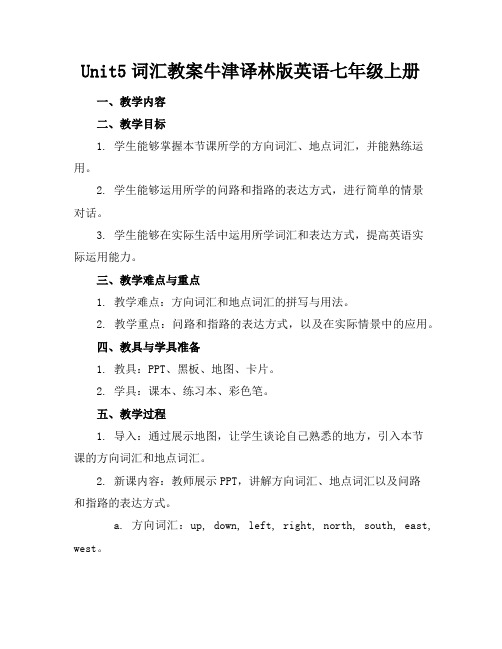
Unit5词汇教案牛津译林版英语七年级上册一、教学内容二、教学目标1. 学生能够掌握本节课所学的方向词汇、地点词汇,并能熟练运用。
2. 学生能够运用所学的问路和指路的表达方式,进行简单的情景对话。
3. 学生能够在实际生活中运用所学词汇和表达方式,提高英语实际运用能力。
三、教学难点与重点1. 教学难点:方向词汇和地点词汇的拼写与用法。
2. 教学重点:问路和指路的表达方式,以及在实际情景中的应用。
四、教具与学具准备1. 教具:PPT、黑板、地图、卡片。
2. 学具:课本、练习本、彩色笔。
五、教学过程1. 导入:通过展示地图,让学生谈论自己熟悉的地方,引入本节课的方向词汇和地点词汇。
2. 新课内容:教师展示PPT,讲解方向词汇、地点词汇以及问路和指路的表达方式。
a. 方向词汇:up, down, left, right, north, south, east, west。
b. 地点词汇:hospital, school, bank, post office, restaurant。
c. 问路和指路表达方式:How can I get to? Go straight ahead. Turn left. Turn right.3. 实践情景引入:教师设置情景,让学生运用所学词汇和表达方式进行问路和指路。
4. 例题讲解:教师通过PPT展示例题,引导学生运用所学知识解决问题。
5. 随堂练习:学生进行小组讨论,完成练习册上的相关习题。
六、板书设计1. 方向词汇:up, down, left, right, north, south, east, west。
2. 地点词汇:hospital, school, bank, post office, restaurant。
3. 问路和指路表达方式:How can I get to? Go straight ahead. Turn left. Turn right.七、作业设计1. 作业题目:根据所学的方向词汇和地点词汇,画一幅地图,并标注出相应的地点。
unit4《food》重点难点讲解(牛津版初一上)doc初中英语
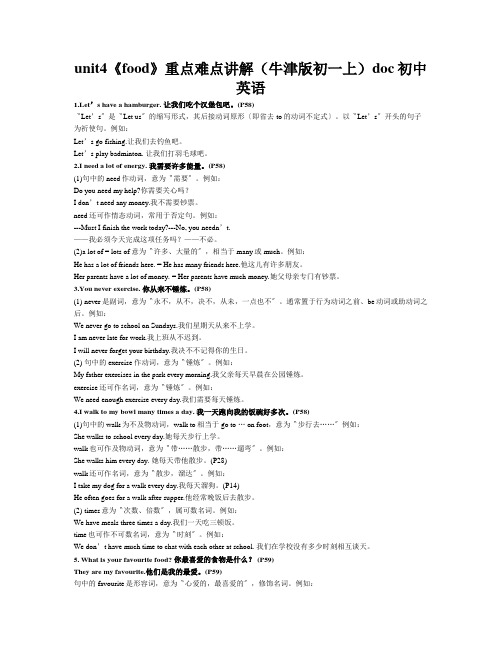
unit4《food》重点难点讲解(牛津版初一上)doc初中英语1.Let’s have a hamburger. 让我们吃个汉堡包吧。
(P58)〝Let’s〞是〝Let us〞的缩写形式,其后接动词原形〔即省去to的动词不定式〕。
以〝Let’s〞开头的句子为祈使句。
例如:Let’s go fishing.让我们去钓鱼吧。
Let’s play badminton. 让我们打羽毛球吧。
2.I need a lot of energy. 我需要许多能量。
(P58)(1)句中的need作动词,意为〝需要〞。
例如:Do you need my help?你需要关心吗?I don’t need any money.我不需要钞票。
need还可作情态动词,常用于否定句。
例如:---Must I finish the work today?---No, you needn’t.——我必须今天完成这项任务吗?——不必。
(2)a lot of = lots of 意为〝许多、大量的〞,相当于many或much。
例如:He has a lot of friends here. = He has many friends here.他这儿有许多朋友。
Her parents have a lot of money. = Her parents have much money.她父母亲专门有钞票。
3.You never exercise. 你从来不锤炼。
(P58)(1) never是副词,意为〝永不,从不,决不,从未,一点也不〞。
通常置于行为动词之前、be动词或助动词之后。
例如:We never go to school on Sundays.我们星期天从来不上学。
I am never late for work.我上班从不迟到。
I will never forget your birthday.我决不不记得你的生日。
(2) 句中的exercise 作动词,意为〝锤炼〞。
英语七年级上册牛津版Unit 1 单元知识要点
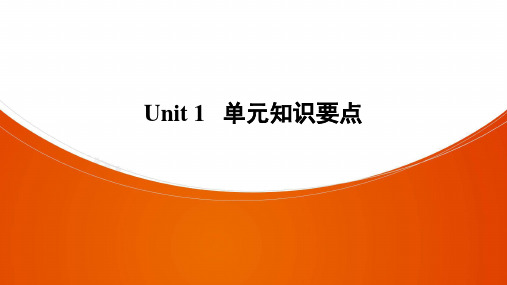
返回目录
Unit 1
单元知识要点
三、不定冠词 a,an 的用法 a 用在以辅音音素开头的词前面,例如:
a man(一个男人);a university(一所大学);a hat(一顶帽子); a European(一个欧洲人)
country n.国家 countryside n.乡村
dream = a series of mental images occurring during sleep n. 梦 dreamer n. 梦想家,不切实际的人
返回目录
Unit 1
单元知识要点
US = United States n. 美国 engineer = a person who use scientific knowledge to solve practical problems n. 工程师 engine n. 引擎 mountain = hill n.山 world = universe = earth n.世界 flat =apartment n.公寓
返回目录
Unit 1
单元知识要点
you→(反身代词)yourself/yourselves country→(复数)countries dream→(动词过去式)dreamed engine→(指人的名词)engineer old→(比较级)elder/ older
返回目录
Unit 1
单元知识要点
返回目录
Unit 1
单元知识要点
特殊疑问词 意思
what
什么
who when
where
谁 什么时候
哪里
用法
用于询问职业或事物是什么
用于询问人的身份 用于询问时间 用于询问地点
牛津沪教版英语七年级上-Units1-5重点知识点复习
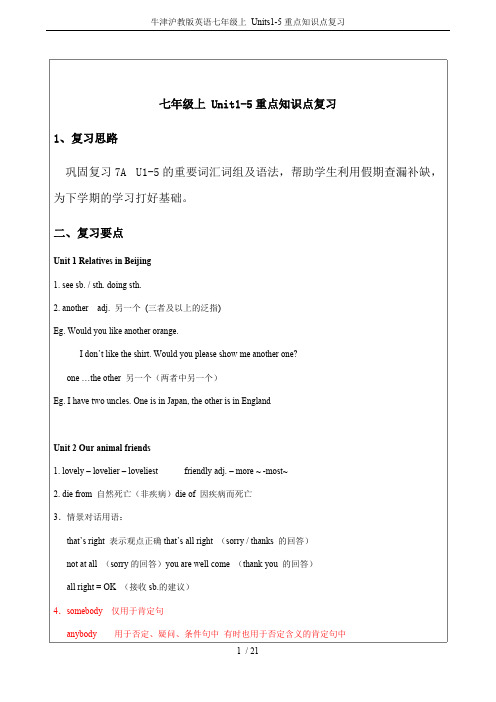
5.leave 离开 leave puppy 遗弃 leave rubbish 扔 leave A to B 离开 A 去 B leave for B 去 B
6.keep +n. + adj. keep +adj. keep doing sth.
7.prefer v. –prefers- preferring-preferred 8.care v. 关心 n. 照料 adj. careful ( opp.) careless
I don’t like the shirt. Would you please show me another one? one …the other 另一个(两者中另一个) Eg. I have two uncles. One is in Japan, the other is in England
3. one’s job be to do
4. deliver v. delivery [c]n. 递送,邮件 deliver sth. to sp. = send
5. bake v.
baker n.
bakery n.
6. cook v. 烧饭 cook n. 厨师 cooker n. 厨具 cookery n. 烹饪
2 / 21
牛津沪教版英语七年级上 Units1-5 重点知识点复习
6. at school 表示在上学 at the school 表示在学校,不一定在上学 8 nationality 国籍 adj.What is your nationality? 回答要用形容词 9 make friends with 与…交友
the same height as = as tall as the same weight as = as heavy as
七年级英语牛津版知识点
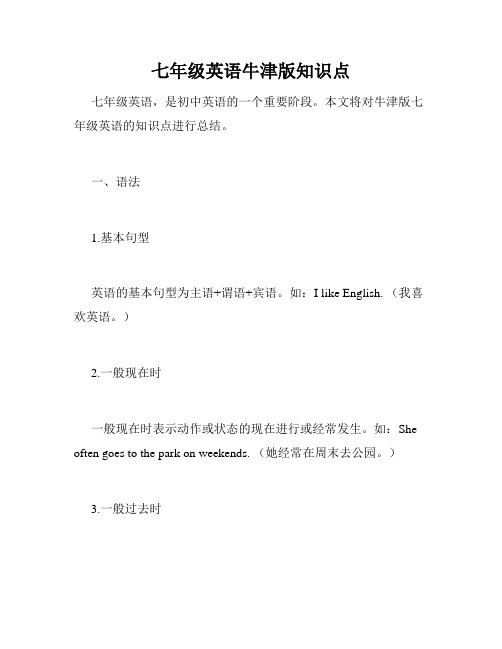
七年级英语牛津版知识点七年级英语,是初中英语的一个重要阶段。
本文将对牛津版七年级英语的知识点进行总结。
一、语法1.基本句型英语的基本句型为主语+谓语+宾语。
如:I like English. (我喜欢英语。
)2.一般现在时一般现在时表示动作或状态的现在进行或经常发生。
如:She often goes to the park on weekends. (她经常在周末去公园。
)3.一般过去时一般过去时表示过去某一时间发生的动作或状态。
如:He watched TV last night. (他昨晚看了电视。
)4.一般将来时一般将来时表示将来某一时间要发生的动作或状态。
如:I will visit my grandparents next week. (我下周会去看望我的祖父母。
)5.情态动词情态动词可以表示说话人的心情、意愿或能力等。
如:We can play basketball together. (我们可以一起打篮球。
)二、词汇1.日常生活用语学生可以学习一些日常生活用语,如问候语、询问时间、询问地址等。
如:How are you? (你好吗?)2.数字在初中英语中,学生需要学习如何用英语说和写数字。
如:twenty-three (23)3.颜色初中英语中也需要学习颜色的表达。
如:green (绿色)三、阅读理解在初中英语中,阅读理解是一个重要的环节。
学生需要阅读各种文章,从中获取信息并回答相关问题。
1.阅读短文学生可以阅读各种长度的短文,从中获取信息并进行理解。
如:Hello, my name is Mary. I live in New York with my family. I have a cat named Ginger. He is very cute. I like to play with him.2.问答题问答题是英语阅读理解中的一个重要环节。
学生需要根据文章提出的问题,回答相关问题。
牛津深圳版英语七年级上册Unit 1 Making friends 重难点知识归纳总结

牛津深圳版英语七年级上册Unit 1 Making friends【重点单词】1.German /ˈdʒɜːmən/ adj. 德国的2.grammar /ˈɡræmə(r)/ n. 语法3.sound /saʊnd/ n. 声音plete /kəmˈpliːt/ v. 完成5.hobby /ˈhɒbi/ n. 爱好6.country /ˈkʌntri/ n. 国家7.age /eɪdʒ/ n. 年龄8.dream /driːm/ n. 梦想9.everyone /ˈevriwʌn/ pron. 人人;所有人10.Germany /ˈdʒɜːməni/ n. 德国11.mountain /ˈmaʊntən/ n. 山;山脉12.elder /ˈeldə(r)/ adj. 年长的13.friendly /ˈfrendli/ adj. 友爱的;友好的14.engineer /ˌendʒɪˈnɪə(r)/ n. 工程师15.world /wɜːld/ n. 世界16.Japan /dʒəˈpæn/ n. 日本17.flat /flæt/ n. 公寓18.yourself /jɔːˈself; jəˈself/ pron. 你自己 n. 美国【重点短语】1.close to (在空间、时间上)接近2.go to school 去上学3.(be) good at 擅长4.make friends with 与……交朋友5.all over 遍及6.’d like to = would like to 愿意7.far away from 远离8.in one’s free time 在某人的空闲时间【重点句型】1.I live with my family in a house close to some mountains.我和我的家人住在一座靠近山的房子里。
2.My mum is an Art teacher.我的妈妈是一位美术老师。
英语:Starter Unit 1 Hello重难点解析(牛津英语七年级上)
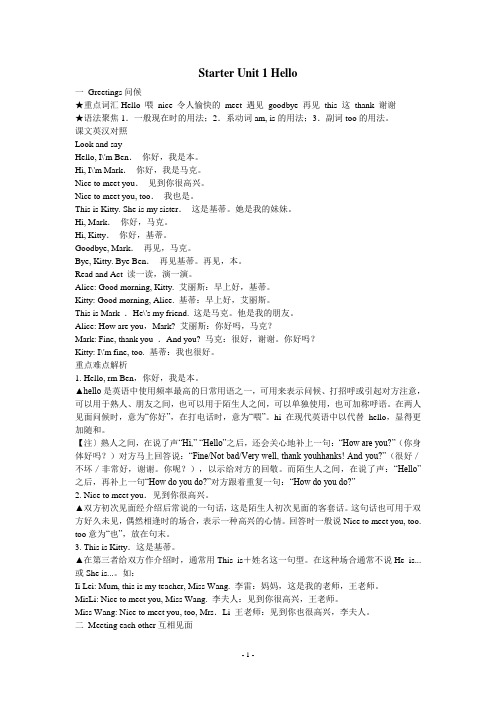
Starter Unit 1 Hello一Greetings问候★重点词汇Hello 喂nice 令人愉快的meet 遇见goodbye 再见this 这thank 谢谢★语法聚焦1.一般现在时的用法;2.系动词am, is的用法;3.副词too的用法。
课文英汉对照Look and sayHello, I\'m Ben.你好,我是本。
Hi, I\'m Mark.你好,我是马克。
Nice to meet you.见到你很高兴。
Nice to meet you, too.我也是。
This is Kitty. She is my sister.这是基蒂。
她是我的妹妹。
Hi, Mark.你好,马克。
Hi, Kitty.你好,基蒂。
Goodbye, Mark.再见,马克。
Bye, Kitty. Bye Ben.再见基蒂。
再见,本。
Read and Act 读一读,演一演。
Alice: Good morning, Kitty. 艾丽斯:早上好,基蒂。
Kitty: Good morning, Alice. 基蒂:早上好,艾丽斯。
This is Mark .He\'s my friend. 这是马克。
他是我的朋友。
Alice: How are you,Mark? 艾丽斯:你好吗,马克?Mark: Fine, thank you .And you? 马克:很好,谢谢。
你好吗?Kitty: I\'m fine, too. 基蒂:我也很好。
重点难点解析1. Hello, rm Ben,你好,我是本。
▲hello是英语中使用频率最高的日常用语之一,可用来表示问候、打招呼或引起对方注意,可以用于熟人、朋友之间,也可以用于陌生人之间,可以单独使用,也可加称呼语。
在两人见面问候时,意为“你好”,在打电话时,意为“喂”。
hi在现代英语中以代替hello,显得更加随和。
【注〕熟人之间,在说了声“Hi,” “Hello”之后,还会关心地补上一句:“How are you?”(你身体好吗?)对方马上回答说:“Fine/Not bad/Very well, thank youhhanks! And you?”(很好/不坏/非常好,谢谢。
译牛7AUnit1重点难点讲解(译林牛津版七年级英语上册教案教学设计)
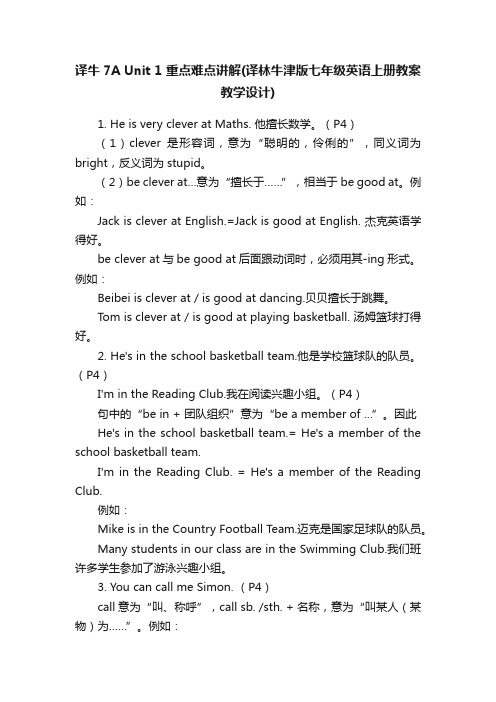
译牛7A Unit 1 重点难点讲解(译林牛津版七年级英语上册教案教学设计)1. He is very clever at Maths. 他擅长数学。
(P4)(1)clever是形容词,意为“聪明的,伶俐的”,同义词为bright,反义词为stupid。
(2)be clever at…意为“擅长于……”,相当于be good at。
例如:Jack is clever at English.=Jack is good at English. 杰克英语学得好。
be clever at与be good at后面跟动词时,必须用其-ing形式。
例如:Beibei is clever at / is good at dancing.贝贝擅长于跳舞。
Tom is clever at / is good at playing basketball. 汤姆篮球打得好。
2. He's in the school basketball team.他是学校篮球队的队员。
(P4)I'm in the Reading Club.我在阅读兴趣小组。
(P4)句中的“be in + 团队组织”意为“be a member of …”。
因此He's in the school basketball team.= He's a member of the school basketball team.I'm in the Reading Club. = He's a member of the Reading Club.例如:Mike is in the Country Football Team.迈克是国家足球队的队员。
Many students in our class are in the Swimming Club.我们班许多学生参加了游泳兴趣小组。
3. You can call me Simon. (P4)call意为“叫、称呼”,call sb. /sth. + 名称,意为“叫某人(某物)为……”。
牛津版七年级英语上册重点知识点复习资料
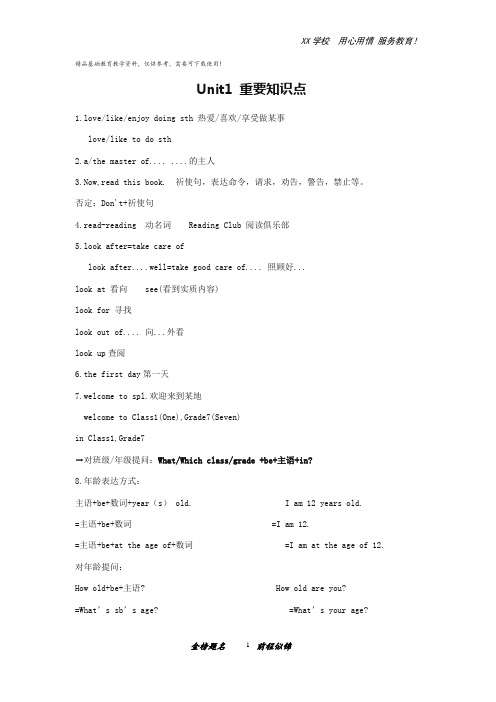
精品基础教育教学资料,仅供参考,需要可下载使用!Unit1 重要知识点1.love/like/enjoy doing sth 热爱/喜欢/享受做某事love/like to do sth2.a/the master of.... ....的主人3.Now,read this book. 祈使句,表达命令,请求,劝告,警告,禁止等。
否定:Don't+祈使句4.read-reading 动名词 Reading Club 阅读俱乐部5.look after=take care oflook after....well=take good care of.... 照顾好...look at 看向 see(看到实质内容)look for 寻找look out of.... 向...外看look up查阅6.the first day第一天7.welcome to spl.欢迎来到某地welcome to Class1(One),Grade7(Seven)in Class1,Grade7➡对班级/年级提问:What/Which class/grade +be+主语+in?8.年龄表达方式:主语+be+数词+year(s) old. I am 12 years old.=主语+be+数词 =I am 12.=主语+be+at the age of+数词 =I am at the age of 12. 对年龄提问:How old+be+主语? How old are you?=What’s sb’s age? =What’s your age?xx-year-old ....岁的 a 12-year-old girl 一位12岁的小女孩9.play+球类运动 play footballplay the+乐器名词 play the piano10.after class/school/lunch....11.be from=come from 来自Where +be+主语+from?=Where+助动词+主语+come from?12.be good at (doing ) sth=do well in (doing) sth 擅长做某事(=do sth well)13.★Be动词的一般现在时15.go walking➡go+v-ing=go for a walkgo swimming=go for a swim16.glad/nice to meet you. ➡It's glad/nice to meet you.It’s+adj.+to do sth做某事....17.I see.我明白了。
2024年英语牛津译林版Unit5reading七年级上教案

2024年英语牛津译林版 Unit5 reading 七年级上教案一、教学内容本节课选自2024年英语牛津译林版七年级上册Unit5 Reading部分,主要内容包括:Chapter 2: Our School,Reading: My School Day。
文章描述了一个学生在学校的一天,详细介绍了他的课程、活动和感受。
二、教学目标1. 能够正确理解并朗读文章,掌握文章中的生词和短语。
2. 能够运用一般现在时描述自己的学校生活。
3. 能够通过文章了解不同国家的学校生活,培养跨文化意识。
三、教学难点与重点1. 教学难点:一般现在时的运用,描述学校生活的词汇和短语。
2. 教学重点:正确朗读文章,理解文章内容,掌握生词和短语。
四、教具与学具准备1. 教具:PPT,录音机,磁带。
2. 学具:教材,笔记本,词典。
五、教学过程1. 导入:通过展示一组国内外学校的图片,引发学生对学校生活的讨论,为新课的学习做好铺垫。
2. 阅读前:引导学生预测文章内容,激活背景知识。
3. 阅读中:学生自主阅读文章,完成相应的练习。
教师进行讲解,帮助学生理解文章,学习生词和短语。
4. 阅读后:小组活动,学生运用一般现在时描述自己的学校生活。
5. 例题讲解:讲解一般现在时的用法,并给出例句。
6. 随堂练习:学生完成课本上的练习题,巩固所学知识。
六、板书设计1. 文章My School Day2. 生词和短语:course, activity, exciting, boring, interesting, at 8:00, fromto3. 一般现在时:主语 + 动词原形(三单形式)/ 现在分词七、作业设计1. 作业题目:描述你的学校生活,至少包括三个课程和三个活动。
2. 答案示例:My school day is very busy. I have three courses: Chinese, math and English. My favorite activity is playing basketball after school.八、课后反思及拓展延伸1. 课后反思:关注学生在课堂上的表现,了解他们对文章的理解程度,调整教学方法,提高教学效果。
Unit3单元重点知识讲解牛津译林版英语七年级上册

七上U3重点知识1.Which subject is your favourite?=Which is your favourite subject?2.one,代指上文提到的同类不同物,但不是同一个人或事(同类不同物)it指上文提到的事物,同类同物3.tell sb about sth =tell sb sth告诉某人某事4.Subjects 科目Art 美术Biology生物Chinese 语文English 英语Geography 地理History历史Maths数学Music音乐PE 体育(学科名首字母大写)5.on the open Day在开放日on+ 星期/日期/节曰/天气,介词短语作状语,位于句子的末尾6.问日期:What's the date today?=What date is it today?问星期几:What day is it today?=What’s the day today?6.show sb sth=show sth to sb把某物展示给某人看show sb around带某人参观7.in front of:外面的前面in the front of:里面的前面。
Eg.There is a big tree in front of our classroom.He is standing in the front of the classroom.8.四个“穿”9.四个花费Spend:Sb spend some time/money on sth/(in)doing sth Take:It/sth takes sb some time to do sthPay:Sb pay some money for sthCost :Sth cost sb some money10.人称代词大表格用法:主格充当主语,宾格用在动词或者介词的后面,形容词物主代词放名词前,名词性物主代词充当名词。
译林版牛津初中英语七年级上册期末复习重难点整理
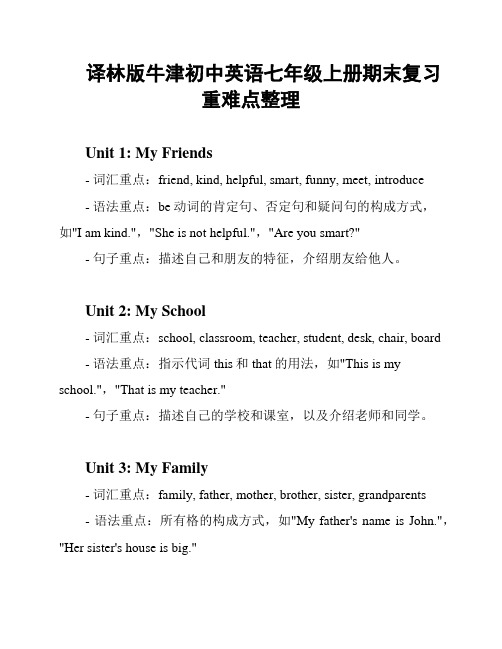
译林版牛津初中英语七年级上册期末复习重难点整理Unit 1: My Friends- 词汇重点:friend, kind, helpful, smart, funny, meet, introduce- 语法重点:be动词的肯定句、否定句和疑问句的构成方式,如"I am kind.","She is not helpful.","Are you smart?"- 句子重点:描述自己和朋友的特征,介绍朋友给他人。
Unit 2: My School- 词汇重点:school, classroom, teacher, student, desk, chair, board - 语法重点:指示代词this和that的用法,如"This is my school.","That is my teacher."- 句子重点:描述自己的学校和课室,以及介绍老师和同学。
Unit 3: My Family- 词汇重点:family, father, mother, brother, sister, grandparents- 语法重点:所有格的构成方式,如"My father's name is John.","Her sister's house is big."- 句子重点:描述自己的家庭和家庭成员,以及介绍家庭成员的特征和职业。
Unit 4: My Day- 词汇重点:day, morning, afternoon, evening, night, breakfast, lunch, dinner- 语法重点:一般现在时态的陈述句和疑问句的构成方式,如"I get up at 7 o'clock.","Do you have lunch at school?"- 句子重点:描述自己的一天,包括起床、用餐、上学等活动。
沪教牛津版七年级英语上册知识点归纳汇总
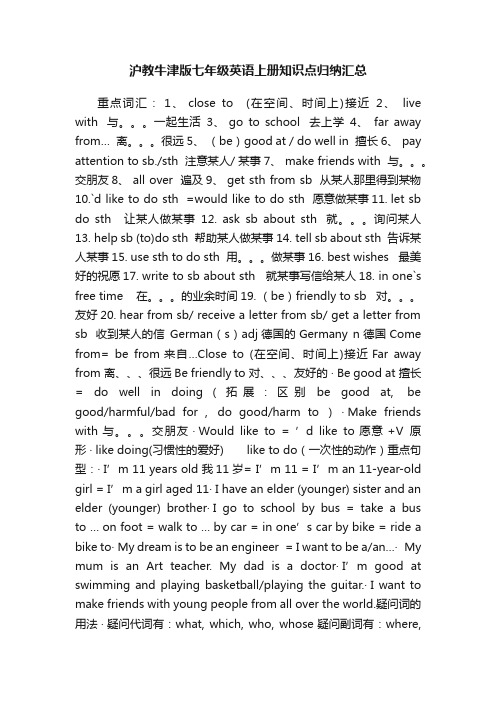
沪教牛津版七年级英语上册知识点归纳汇总重点词汇: 1、 close to (在空间、时间上)接近2、live with 与。
一起生活3、 go to school 去上学4、far away from… 离。
很远5、(be)good at / do well in 擅长6、 pay attention to sb./sth 注意某人/ 某事7、 make friends with 与。
交朋友8、 all over 遍及9、 get sth from sb 从某人那里得到某物10.`d like to do sth =would like to do sth 愿意做某事11. let sb do sth 让某人做某事12. ask sb about sth 就。
询问某人13. help sb (to)do sth 帮助某人做某事14. tell sb about sth 告诉某人某事15. use sth to do sth 用。
做某事16. best wishes 最美好的祝愿17. write to sb about sth 就某事写信给某人18. in one`s free time 在。
的业余时间19. (be)friendly to sb 对。
友好20. hear from sb/ receive a letter from sb/ get a letter from sb 收到某人的信German(s)adj 德国的 Germany n 德国 Come from= be from 来自…Close to (在空间、时间上)接近 Far away from 离、、、很远Be friendly to 对、、、友好的· Be good at 擅长= do well in doing(拓展:区别be good at, be good/harmful/bad for , do good/harm to )· Make friends with 与。
- 1、下载文档前请自行甄别文档内容的完整性,平台不提供额外的编辑、内容补充、找答案等附加服务。
- 2、"仅部分预览"的文档,不可在线预览部分如存在完整性等问题,可反馈申请退款(可完整预览的文档不适用该条件!)。
- 3、如文档侵犯您的权益,请联系客服反馈,我们会尽快为您处理(人工客服工作时间:9:00-18:30)。
七年级英语上 Unit 5 重点难点讲解1. I want you to go shopping with me today.今天我想要你和我一起去购物。
(P70)此句型为want sb. to do sth.,意为“想要某人干某事”,want是及物动词,to do sth.为动词不定式作宾语补足语。
例如:He wants me to help her with her maths.他想要我在数学方面帮助她。
want还可接名词或动词不定式作宾语,即want sth.或want to do sth.。
例如:She wants a pair of jeans.她想要一条牛仔裤。
I want to buy a lot of things.我想要买许多东西。
(P70)I want to see my parents this weekend.这个周末我想去看望我的父母亲。
’m not free today.我今天没空。
(P70)free是形容词,意为“空闲的,有空的”。
常与be (am, is are, was, were)动词连用。
例如:She is not free now.她现在没空。
Are you free this evening 你今晚有空吗need you to carry all the bags.我需要你拿所有的包。
(P70)(1)此句型为need sb. to do sth.,意为“需要某人干某事”,need是及物动词,意为“需要”,to do sth.为动词不定式作宾语补足语。
例如:He needs his parents to clean his bedroom.他需要父母亲打扫卧室。
need还可接名词或动词不定式作宾语,即need sth.或need to do sth.。
例如:I need a lot of energy. 我需要许多能量。
(P54)Do we need to buy some vegetables 我们需要买些蔬菜吗 (P62)(2)carry意为“搬运、随身携带”,还含有“肩挑、手提”的意思。
例如:Could you help me carry the box 请你帮我拿这个箱子,好吗bring和take也有“拿、带”的意思,但用法各不相同。
bring意为“拿来、带来”,指把某物或某人从别处带到说话处。
例如:You must finish reading the magazine this evening and bring it here tomorrow.你必须今天晚上看完这本杂志,明天把它带到这儿来。
Your cousin asked me to bring you a birthday present. 你表哥让我给你带来一件生日礼物。
take意为“拿去、带去”,指把某物或某人从说话处带到别处去,它与bring所表示的方向相反。
例如:Take away this empty bottle, and bring me a full one,please.把这个空瓶拿走,请给我拿个满的来。
I help you 你想要点什么(72)What can I do for you我能帮你忙吗(72)Can I help you 与What can I do for you两者可用来询问别人是否需要服务或提供帮助,意为“要我帮忙吗”,在不同的场合表达不同的意义。
例如:在图书馆,图书馆管理员对你说Can I help you或What can I do for you,表示:“您要借书吗”在商店,营业员对顾客说,表示“您想要买点什么”。
Can I help you 还可表达成:Could I help you 或May I help you,这两者在语气上要比Can I help you 更加客气、委婉。
’m looking for some football cards and stickers of Huanghe Football Team. 我在找些足球卡片和黄河足球队的贴花纸。
(P72)look for意为“找,寻找”。
例如:He is looking for his comic book.他在找他的连环画。
She is looking for her mother.她在找她母亲。
(P85)6. There are some cards and stickers over here.那儿有些卡片和贴纸。
(P72)over here意为“在这儿,在这边”,在句中可作状语。
over here也可在句中作表语、定语。
例如:My car is over here.我的车在这儿呢。
(表语)You can ask the man over here.你可以问问这边的那个人。
(定语)Please put your school things over here.请把你的学习用品放在这儿。
(状语)7. Take a look.看一看(P72)take a look 相当于have a look,意为“看一看”。
若表示“看一看某物”时,则后跟介词at,表达为:take a look at…或have a look at…。
例如:Take a look at her hair clips. How lovely! 看一看她的发夹,多漂亮啊!Let me have a look at your new watch, please. 请让我看一看你的新手表。
8. How much do the cards cost卡片多少钱(72)(1)how much可用来询问价格、价钱,或对不可数名词的数量提问。
例如:How much is your CD It’s ten yuan.你的CD多少钱10元。
How much does the Walkman cost It’s about 120 dollars.这个随身听多少钱大约120元。
(2)cost是动词,意为“花费”,其主语为物,后接表示“金钱”的名词作宾语。
例如:This teddy bear costs twenty yuan.这只玩具熊20元。
表示“某人花钱干某事”,用spend的句型,其主语必须是人,动词用-ing形式。
He spent two hundred yuan buying this watch.他买这块手表花了200元。
spend后接名词时,用介词on。
“他买这块手表花了200元。
”这句也可表达成:He spent two hundred yuan on this watch.spend还可表示“某人花时间干某事”,这时用句型(人)spend some time on sth / doing sth.。
例如:She usually spends half an hour on English.You mustn’t spend too much time playing volleyball.也可用句型It takes sb. some time to do sth. 表示“干某事花某人多少时间”。
例如:It usually takes her half an hour to read English.读英语花费她半小时。
It usually takes me more than two hours to do homework.家庭作业通常花我两个多小时。
9. I want to buy a present for my friend. (P72)buy意为“买”,表示“给某人买某物”时,可用句型buy sb sth,也可用give sth for sb。
因此原句也可表达为:I want to buy my friend a present.。
例如:I also want to buy a CD for her.= I also want to buy her a CD .我也想给她买个CD。
(P72)I don’t have enough money to buy her a CD then.我没有足够都的钱给她买CD了。
(P72)Maybe you can buy him a football in the sports shop.= Maybe you can buy a football for him in the sports shop.也许你可以在体育用品商店给他买个足球。
(P75)10. I’m sure you can find some nice clips for your friend. (P72)(1)find意为“找到、发现”。
例如:She can’t find her mother. 她找不到她母亲。
(P72)(2)look for 和find 都有“找”的意思。
但look for强调找的动作,find强调找的结果。
例如:What are you looking for My bag. But I can’t find it. 你在找什么我的包,但我找不到。
He is looking for his little dog, but he can’t find it. 他在找他的小狗,但他没找到。
(3)find与find outfind通常指找到或发现具体的东西,也可指偶然发现某物或某种情况。
例如:I looked for my pen here and there, but didn’t find it.我到处找我的钢笔,但没找到。
find out意为“找出、发现、查明”,多指通过调查、寻问、打听、研究之后“搞清楚、弄明白”,通常含有“经过困难曲折”的含义,指找出较难找到的、无行的、抽象的东西。
例如:Please find out when the train leaves.请查一下火车什么时候离站。
11. They match her favourite T-shirt.他们与她的T恤相配。
(P72)match为动词,意为“适合,(与……)想配”,相当于go well with。
例如:This pair of boots matches my jeans.这双靴子配我的牛仔裤。
Match还可作名词,意为“比赛”。
例如:I like watching football matches very much.我非常喜欢看足球比赛。
12. I don’t have enough money to buy her a CD then.我没有足够都的钱给她买CD了。
(P72)(1)句中的enough是形容词,用来修饰名词,enough修饰名词时可以置于名词的前面,也可置于名词的后面。
